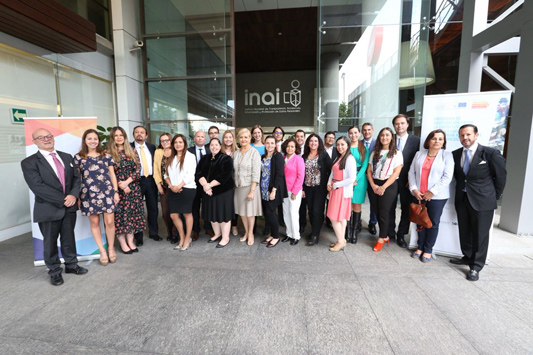
Involving more than a dozen experts from six countries of the region the
“Second Workshop: The Gender Perspective in the Model Law of Access to Public Information 2.0”
was successfully staged on May 17.
Organized by the Department of International Law (DIL) of the OAS Secretariat for Legal Affairs, the event was held under the auspices of EUROsociAL, with institutional support from the Mexican National Institute for Transparency, Access to Information, and Personal Data Protection (INAI) and the Transparency and Access to Information Network (RTA). The OAS program was included in the slot offered by the organizers of the workshop put on by the RTA Working Group on Transparency and Gender from May 16 to 18.
The event, which was hosted at the INAI in Mexico City, drew participation from oversight bodies and experts in access to public information and gender from Chile, Colombia, Costa Rica, El Salvador, Mexico, and Uruguay, as well as of experts from INAI and EUROsociAL.
The purpose of the Workshop was to garner
international input towards including a gender
perspective and use of inclusive language in
Model Law 2.0 on Access to Public Information,
being crafted by the DIL/OAS. The Workshop also
featured an open discussion component and an
extensive exchange of views, with participants
providing specific input on the gender aspects
to be considered in preparing the Model Law 2.0.
In addition to the contributions of subsequent events and focus groups, the input from this Second Workshop will enable the DIL to prepare an up-to-date, more robust Inter-American Model Law on Access to Public Information to send to the Inter-American Juridical Committee – the main OAS advisory body on legal matters – for consideration. It will then be referred to the General Assembly itself for adoption.
Discrimination and violence against women remain a major problem in the Americas, and the right of access to public information offers a series of critical assurances in that fight, such as the obligation of the state to collect and produce information; the obligation to respond promptly to information requests; and the guarantee of effective remedy that addresses the right.
On that score, it must be recognized that less access to public information affects certain sectors more than others – the difficulties are more prominent among poor women, indigenous people, people of African descent, and people living in rural areas, for example.
As a key right for the exercise of other rights, not only can access to public information help women make more effective and informed decisions about crucial issues in their lives – such as education, health care, and work – but it can also be vital to their economic empowerment, their participation in public life, and to promotion and protection of their human rights.
In this respect, significant challenges remain. Current laws on access to information have not pursued the gender perspective in depth. The same can be said about the current Inter-American Model Law on Access to Public Information – hence the need for more progress in producing and disseminating information, statistics, etc., which should be collected by public institutions and disaggregated at least by sex, gender, ethnicity, socioeconomic status, and disability situation, so as to be able to detect and prevent the various types of violence and discrimination that women suffer.
» For the Model Inter-American Law on Access to Public
Information,
click here
» For the Inter-American Program on Access to Public
Information,
click here
»
Cooperation Project,
click here
For further information on this matter,
please contact the Department of International Law of the Secretariat for Legal Affairs of the OAS +1 202 370 0743.